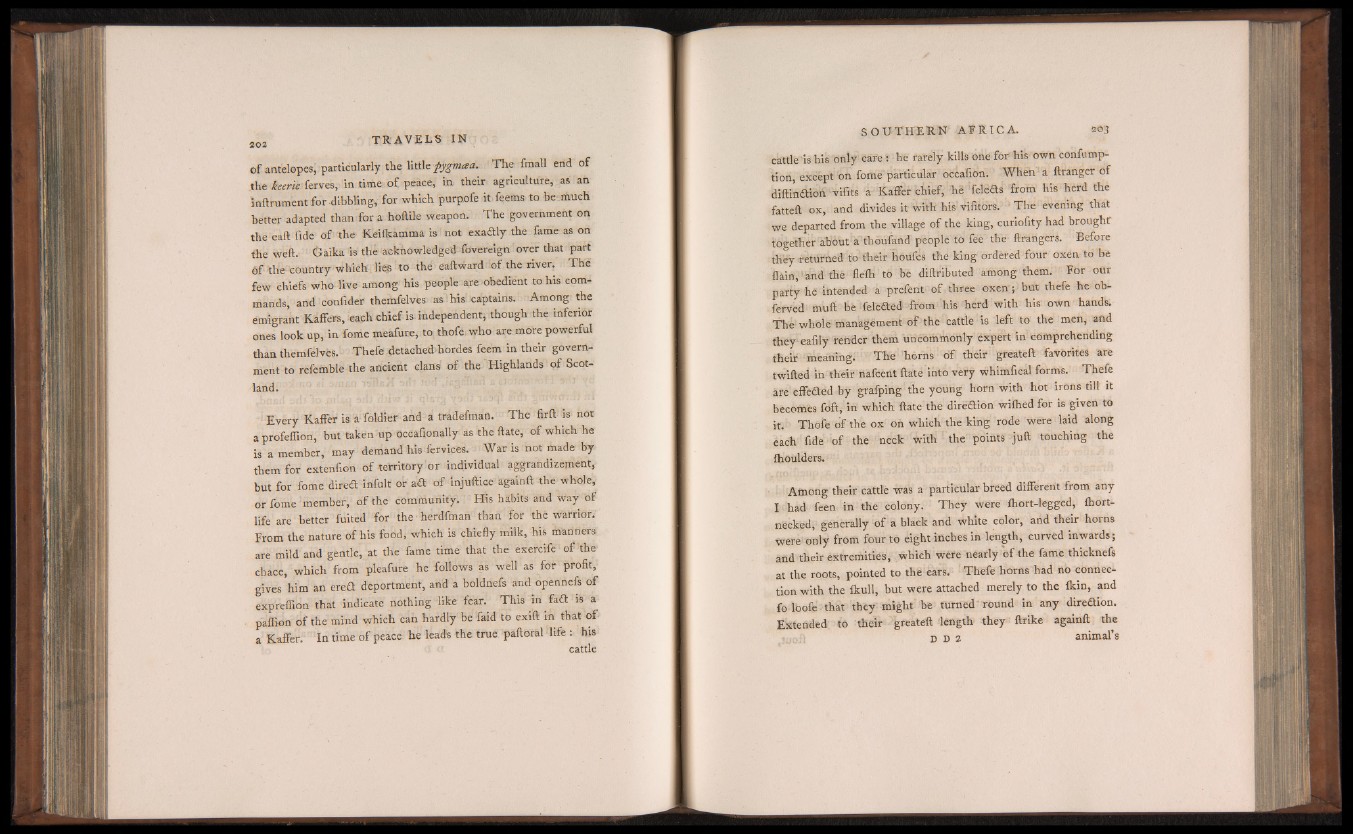
o f antelopes, particularly the little pygmata. The fmall end of
the keerie ferves, in time of peace, in their agriculture, as an
inftrument for dibbling, for which purpofe it feems to be much
better adapted than for a hoflile weapon. The government on
the eaft fide of the Keiikamma is not exadly the fame as on
the weft. Gaika is the acknowledged fovereign over that part
o f the Country which lies' to the eaft ward of the river. The
few chiefs who live among his people are obedient to his commands,
and confider themfelves as his: captains. Among the
emigrant Kaffers, each chief is. independent, though the inferior
ones look up, in fome meafure, to thofe. who are more powerful
than themfelves. Thefe detached hordes feem in their government
to referable the ancient clans of the Highlands of Scotland.
Every Kaifer is a foldier and a tradefman. The firft is not
a profefiion, but taken up occafionslly as the ftate, of which he
is a member, may demand his fervices. War is not made by
them for extenfion of territory or individual aggrandizement,
but for fome dired infult or ad of Injuftice againft the whole,
or fome member, o f the community. His habits and way of
life are better fuited for the • herdfman than for the Warrior/
From the nature of his food; which is chiefly milk, his manners
are mild and gentle, at the fame time that the exercife ‘ of the
chace, which from pleafure he follows as well as for profit,
gives’him an ered deportment, and a boldnefs and opennefs of
expreflion that indicate nothing like fear. This in fad is a
paflion o f the mind which can hardly be faid to exift in that of
a Kaffer. In time of peace he leads the true paftoral life : his
cattle
cattle is his Only care : he rarely kills one for his own confump-
tion, except on fome particular occafion. When a ftranger of
diftindiori vifits a Kaffer chief, he Teleds from his herd the
fatteft ox, and divides it with his:vifitors. The evening that
we departed from the village of the king, curiofity had broughf
together about a thoufand people to fee the ftrangerS. Before
they returned to their houfes the king ordered four oxen to be
flain,1 and the fleih to be diftributed among them. For our
party he intended a prefent of three oxen; but thefe he ob-
ferved muft be feleded from his herd with his own hands.
The whole management of the cattle is left to the men, and
they eafily render them uncommonly expert in comprehending
then* meaning. The horns of: their greateft favorites are
twifted in their nafcent ftate into very whimfical forms. Thefe
are effeded by grafping the young horn with hot irons till it
becomes foft, in which ftate the diredion wiihed for is given to
it. Thefe of the ox on which the king rode were laid along
each fide of the neck with the points juft touching the
ihoulders.
Among their cattle was a particular breed different from any
I had feen in the colony. They were ihort-legged, fhort-
necked, generally of a black and white color, and their horns
were only from four to eight inches in length, curved inwards ;
tod their extremities, Which were nearly Of the fame thicknefs
at the roots, pointed to the ears. Thefe horns had no connection
with the ikull, but were attached merely to the fltin, and
fo loofe that they might be turned round in any diredion.
Extended to their greateft length they ftrike againft the
D D 2 animal’ s